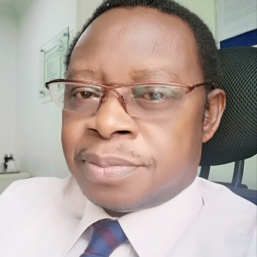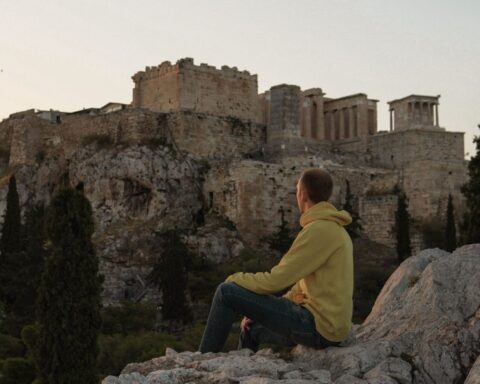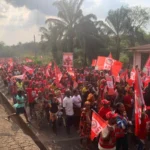By Dr. Charles Obiajulu Ugwu
It began at least for me with a video. A shaky, unfiltered TikTok, recorded on a cracked android phone by a young Ghanaian woman. The setting was casual maybe her bedroom, but the message was crystalline and hard. In the clip, she narrates with chilling clarity the new global pastime: identifying and ejecting Nigerians from everywhere. Trust the loud Nigerians and their penchant for reacting not responding. While a few saw the commentary from a supposedly lower clime as an insult, a good number saw the truth in her comments. The response from a particular individual was even more punchy “You people don’t know what your name has become.
Even in countries we didn’t use to hear about like Kyrgyzstan, Honduras, Serbia, if you’re Nigerian, it’s like having a tattoo on your forehead. They suspect you, they mark you, they prepare your deportation papers before your visa expires. ”She wasn’t laughing. Neither were the millions who watched and nodded. She went on, detailing how immigration officials in Europe and Asia now flag Nigerian passports with extra scrutiny. How fellow Africans in embassies avoid associating with Nigerians for fear of complicity.
How even Uber drivers in Casablanca and Nairobi ask you “Are you Nigerian?” before deciding whether to take the ride. And here’s the haunting punchline: “The name Nigeria used to open doors. Now, it locks them before you knock. ”That video wasn’t satire. It was a mirror. And if we still had a working national conscience, we would have shattered from the reflection.
The Collapse has a Smile on It. The scariest part of Nigeria’s ongoing moral and civic collapse isn’t the dysfunction rather it is the drama. The performance. The self-deception. We wear our rot like regalia. We perform shame so well we’ve mistaken it for culture. There is no doubt: Nigeria is now a globally stigmatized identity. A passport that once hinted at possibility now forecasts suspicion. Once upon a time, being Nigerian was shorthand for boldness, creativity, and potential. Now it often signals danger, fraud, chaos, trouble. And yet, somehow, the country laughs. We trend on social media for scandals, not science. For internet fraud, not innovation. For pastors sleeping with congregants, not for policy brilliance. Our comedy skits are global; our corruption cases are legendary. The louder the collapse, the harder we cheer. This isn’t mockery. It’s pathology.
How Did We Become the Warning Sign? It’s tempting to treat all this as perception. As though Nigeria was simply a misunderstood genius-child. But that’s dishonest. We didn’t get here by accident. We earned our bad name the old-fashioned way through decades of failure, impunity, and proud dishonour. Start with corruption. Not as a headline but as a bloodstream. It is everywhere. It is mundane. Judges take bribes to twist truth. Contractors inflate costs and build nothing.
Universities admit unqualified students for cash. Police officers openly auction their integrity at roadblocks. According to Transparency International’s 2024 index, Nigeria ranks 140th out of 180 countries. A country with oil, gas, tech talent, and a global diaspora but no working moral compass. In some cities, getting a driving license or a building permit legally is considered naive. It’s not that people can’t be honest. It’s that honesty no longer fits into the operating software. It’s like trying to insert a clean wire into a system built to burn.
The Hunger is Loud, The Silence Louder. Meanwhile, over 46% of Nigerians live below the poverty line. In 2025, a report from Katsina revealed that 652 children died from malnutrition in six months. These were not remote villages where the state cannot reach. These were places the state had already abandoned. In the face of this, the political elite continue as if managing a simulation, not a republic. Governors erect billion-naira roundabouts. Lawmakers travel abroad for checkups while local hospitals rot without syringes. Ministries publish budgets that feel like speculative fiction. And the people? Many are numb. Others normalize it. “Na God go help us.” That phrase isn’t faith it’s fatigue.
Trust? Buried Somewhere Between Elections. Ask a Nigerian who they trust and you’ll notice a pattern: the farther you go from government, the more trust you find. People trust herbalists more than police. They trust Instagram therapists more than elected representatives. They trust the lottery more than the judiciary. According to Chatham House data, over 60% of Nigerians have no trust in the presidency or federal government. The National Assembly is viewed as a joke. Even religious institutions once sacred, are now suspect. When pastors buy jets and build empires while preaching sacrifice, who wouldn’t be cynical? In this vacuum of legitimacy, conspiracy theories flourish. So does apathy. And worse: so does survivalism. Everyone for themselves. Just escape. Just japa.
What You Export is What You are It’s easy to accuse the world of bias. Yes, xenophobia exists. But let’s be honest: Nigeria’s global reputation didn’t arise in a vacuum. Our exports now include oil, remittances and fraud. Yahoo boys (internet fraudsters) are no longer hiding in the shadows. They are heroes in music videos. Role models on Instagram. They wear their crimes like designer cologne, loud, expensive, and toxic. This isn’t about the poor choices of a few. It’s about what we, as a society, reward. In a nation where genuine entrepreneurship struggles to breathe under the weight of bureaucracy, corruption, and no infrastructure, the fastest way to wealth is often illegality. And society barely flinches when criminals drive Lamborghinis while lecturers beg for fuel, don’t be surprised when young boys choose crime. They’re just reading the room.
The Flight of the Talented; In a saner world, the elite would panic at the loss of brains. But in Nigeria, brain drain is a footnote until their children need doctors. Over 75,000 medical professionals have left in the past five years. Nurses, engineers, tech founders they’re all vanishing. And who can blame them? When safety is a privilege, electricity a gamble, and merit an afterthought, escape feels like evolution. What’s left behind? A middle class that is shrinking. A poor class that is swelling. And a ruling class so detached that it holds press conferences on platforms it can’t pronounce.
We Are Not Resilient. We Are Rehearsed. One of the most dangerous myths in Nigeria is that we are “resilient.” That we are strong, joyful, indomitable. What if we’re not? What if we are merely well-trained to endure? What if our so-called resilience is just advanced dissociation? But a learned helplessness wrapped in religious platitudes and celebratory dance? We laugh. We joke. We move on. But deep down, a rot persists. A sadness. A bitterness that seeps into the bloodstream. Watch the average Nigerian abroad. Their energy is different. Suspicious, defensive, determined to prove they’re not “one of those ones.” That Ghanaian woman in the TikTok wasn’t being mean. She was being precise. Nigerians are now profiled. Because when the rot is so loud, it’s hard for outsiders to discern who’s clean. This Is not a Joke anymore. The world isn’t laughing with us. They’re laughing at us. And in some rooms, they’re not even laughing. They’re making decisions, denials, deportations, red-flagging of passports. Nigerian students are being denied visas because their institutions are considered corrupt. Nigerian tech entrepreneurs are scrutinized more. The world is reclassifying us, not based on race or tribe, but on pattern recognition. It is not fair. But it’s real.
So What Then? Do We Burn or Build. It would be convenient to end here. To shake our heads and scroll past the problem. But we can’t afford that anymore. Not morally. Not practically. The redemption of Nigeria if it is still possible, will not come from slogans or rebranding campaigns. It will require a national detox. From top to bottom. From the street trader who cheats on scale to the senator who ghosts committees. From the media house that buries truth to the church that sells miracles. It will require telling the truth. First to ourselves. Then to each other. It means refusing to normalize the absurd. It means resisting the laughter that numbs. It means mourning the collapse not entertaining it.
I am a Nigerian. And I am Tired. Unapologetically contrarian with no alternative than to hang in here. Tired of explaining. Tired of apologizing. Tired of watching children die while politician dance. Tired of watching brilliant young minds become beggars to embassies. Tired of the shame that lingers even in rooms where I’ve earned my presence and worth. But fatigue is not surrender. Not yet. Because somewhere in the rubble is a generation that sees it all and is quietly planning a different script. Some are building companies with code instead of scams. Some are teaching students how to question, not just pass. Some are entering politics not to steal, but to stay human. They are few. They are tired. But they exist. And if we want any kind of future that is not footnoted with disgrace, we must amplify them. Not the laughter. Not the spectacle. But the quiet work of those refusing to be a joke.
Final word If the world has begun to mark and mock Nigerians, it is not simply their prejudice at play. It is our reflection bouncing back. We cannot silence the mirrors. But we can clean the face that stares back. We’ve been applauding our own fall long enough. It’s time to stand still. To shut up. And maybe finally to change.
The Author
Charles Obiajulu Ugwu writes from Lagos



























